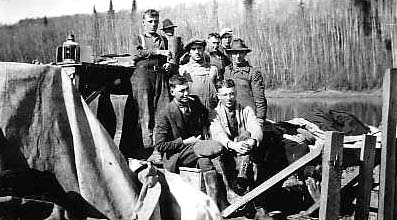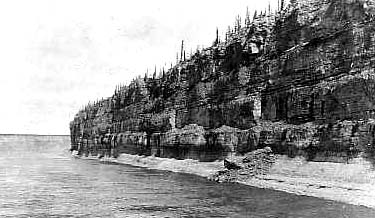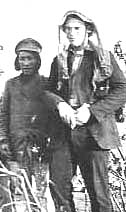|
A series of events ... |
|||||||||||||||
| Back to part 1 | |||||||||||||||
 |
|||||||||||||||
| Photo time -
Willard Haig - front right. |
|||||||||||||||
| A series of amusing events which occurred on this initial trip involved my brother Willard. The captain of the ship, prior to our leaving Fort Smith had sized up his crew and, noting that Willard was slim and less rugged in appearance than most of us, had relieved him of deck-hand duties and assigned him to the job of bull cook. We deck-hands worked hard unloading heavy boxes of freight at the various posts and at loading the huge bales of furs aboard en route to the outside. At designated areas too, we had to take aboard the cord wood which was used as fuel for the ship. However, when our heavy work was done, we were free from duties and could play cards and other games to heart's content. Willard, on the other hand, as bull cook, in the morning arose before the rest of us and began peeling potatoes and other vegetables before each meal. Then he washed the dishes after each meal, after which he would immediately begin preparing the vegetables for the next meal. In fact, the poor lad's work was never done. He sized up the deck-hand crew carefully for signs of dislike for the strenuous work which we were periodically exposed to, and eventually, he picked one chap whom he thought he could arrange a switch with if he used his wits. He picked a university of Alberta student who was enrolled in the Faculty of Education named McCullough, and on occasions, when this lad appeared fatigued and discouraged, after a strenuous work session, he would tease him and brag about the soft easy job which he enjoyed. At a time which Willard thought was opportune, he suggested a switch of jobs and the offer was accepted with alacrity. After a day or two as the bull cook, McCullough realized that he had been tricked. The rest of the crew teased and tormented him which aggravated his discontent. I can see him now in my mind's eye, sitting with a green and gold beanie on his head, peeling potatoes and uttering curses under his breath.
|
|||||||||||||||
 |
|||||||||||||||
| The Ramparts | |||||||||||||||
| After leaving Fort Norman and before arriving at Arctic Red River and at Fort Good Hope, we passed through the Ramparts, the area in which the river narrows down to about 1/4 of its normal width, and where steep perpendicular banks present a striking and unusual appearance. The down stream current is particularly swift and the river depth was said to be very great in this gorge - like a section of the Mackenzie. One of the problems which we experienced at this stage of our journey was to decide when to sleep as we had continuous daylight for the sun would disappear below the horizon for only a very short period and there was no darkness. It was interesting to note, that under these conditions, garden produce, both vegetables and flowers were about as advanced in mid-July there, at the Arctic Circle, as they would have been in Edmonton. When we stopped at an outpost at the Mackenzie River delta, we were surprised to-see the-fine fishing schooners which a group of Eskimos gathered there, possessed. An interesting incident occurred when Willard was standing on shore preparing our Kodak camera to photograph some of the Eskimos along with their fishing schooners. He became aware that a young native Eskimo was looking over his shoulder and appeared most interested. Willard felt that he should explain the mechanism of the camera to this underprivileged native, but to his amazement the young fellow spoke up in flawless English stating the make and factory number of the Kodak the size of the picture it took and in fact, more detail relative to it than either of us knew about our camera. Our last port of call on this trip was back out of the Mackenzie delta, up the Peel River to Fort MacPherson. There are interesting memories associated with our visit to this Fort. Firstly, the weather was depressingly hot and we had a large quantity of heavy freight to unload and then many bales of fur to carry aboard. Secondly, the bulldog flies were particularly vicious that day as we carried on with our job. Thirdly we worked shorthanded because one of our lads, a university student too, stayed in his bunk presumably ill. He recovered however, very quickly, after all the work was completed, and when he heard that a dance was being staged that evening in honour of the ship's arrival. He lost the respect of his fellow deck-hands by turning up for the affair apparently hale and hearty. |
|||||||||||||||
 |
|||||||||||||||
| I was fascinated by the presence of a young Eskimo under arrest for murder. He sat on the floor on the side lines at the dance in the custody of an officer of the RCMP He had been brought to the Fort a day or two before, from the post at Coronation Gulf to be tried by Judge Dubuc who was a passenger on our ship. His name was Alikomiyak, and I have in my possession still, photographs of him. He supposedly had killed a Hudson's Bay factor at Coronation Gulf and when being tailed by an RCMP constable had shot and killed this officer too. He was an innocent looking young fellow with a puzzled expression on his face. Undoubtedly he was very bewildered by the customs of the white man. I do not recall ever hearing what his punishment was, but I do not think he was executed for murder. |
|||||||||||||||
| Everyone likes to be photographed with a celebrity. | |||||||||||||||
| After leaving Fort MacPherson on the return trip to Fort Smith, we stopped at the various Hudson's Bay posts en route, to load the bales of fur which we were told were destined to be shipped to the Hudson's Bay Company overseas to be fashioned into beautiful furs for the ladies. Whereas it had taken just over a week to make the down stream trip subtracting of course the delay experienced at the entrance to the Great Slave Lake due to ice, it required approximately twice this time to return up stream against the current to Fort Smith. At the conclusion of this trip, the purser, a young chap named Potter from Edmonton, quit his job, as did the University of Alberta student who had conveniently remained in bed to avoid the heavy work session at Fort MacPherson some two weeks before, This young man's life had not been too pleasant during the return trip. Willard obtained the purser's job thereafter, and the salary was $60.00 per month and besides, he had charge of some stores, such as cigarettes, chocolate bars and soft drinks etc. which he sold with a percentage of profit. We were indeed pleased that our financial status had improved. Another Edmonton member of the deck hand crew was forced to leave the ship upon its return to Fort Smith because arrived in port ill. He was put in the Catholic Mission Hospital there. It was not until we had returned from our second and final trip of the season, that we were informed that he had-had typhoid fever and had died. We felt fortunate indeed that other cases had not developed among our crew. On our second trip we travelled only as far north as Fort Simpson. During this trip, the deck-hand sleeping area, which was situated directly over the ship's noisy engines, and on the lower deck, became infested with lice. This was not surprising, for between ports of call, there were generally Indians who were allowed passage for a nominal fee on the lower deck, using their own blankets on the deck floor. We were fascinated as we watched the women examine the scalps of their offspring for lice. These lice they would eradicate by crushing them between their teeth. I was fortunate when this situation developed that the new purser had an upper bunk in his cabin on the second deck of the ship, which the compassionate captain allowed me to occupy. When we returned from the north country about mid-September, we felt that we had had a wonderful experience and moreover, we had saved our wages and each of us had also managed to supplement our earning to some extent. Also, we were impressed with the fact that some of the crew who had not the stimulus of educational goals, had lost most, and in some cases, all of their wages at the poker table during the summer. We had watched with interest many of the games but had refused to wager any of our hard earned money. |
|||||||||||||||
|
|
|||||||||||||||
| Back to part 1 - Our Mackenzie River Adventures
To part 3 - Our Mackenzie River Adventures |
|||||||||||||||